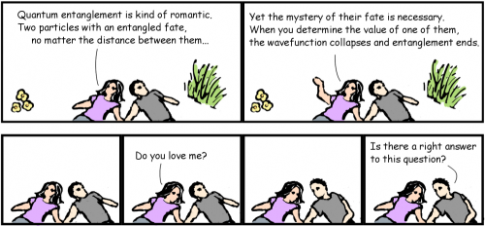Continuing about the New Directions in the Foundations of Physics conference in Washington DC, the bulk of the quantum mechanics presentations were in the information approach. (You can check my earlier post about building "black holes" in the lab here.)
Quantum mechanics is strange. Really strange. But it turns out quantum mechanics is not as strange as it could be, and looking at things from the information point of view does help clarify some issues.
Before presenting the talks, I want to set the stage with a few key facts about this area. A basic ingredient in this area is entanglement which is viewed as a resource able to pull impossible feats in classical mechanics, like teleportation. The origin of entanglement is well understood: it is the dimensionality of the Hilbert space N2 which is larger than the dimensionality of an equivalent classical phase space N1. This in turn means that after interaction, two systems have collectively more information about them then each subsystem; in other words, the whole is bigger than the parts and the joined state is not factorizable. EPR paper was strongly against this and proposed that quantum mechanics is incomplete and hidden variables are responsible for its indeterminacy. After EPR, the foundational area remained dormant for a while, until John Bell broke the deadlock by finding inequalities which were satisfied by the classical physics (and hidden variable theories), but violated by quantum mechanics and the violations were subsequently observed by the Aspect experiment.
Fast forward again, and in 1980 Tsirelson asked the question: if Bell gave us the classical mechanics/hidden variables inequalities, what are the corresponding quantum mechanical inequalities? In the standard CHSH inequality, Bell bound is 2, while Tsirelson's bound in 2sqrt(2). Independent of this, Aharonov proposed that the axioms of quantum mechanics should be relativistic causality and nonlocality.
Was Aharonov's conjecture correct? No. In 1994, Popescu and Rohrlich proved that wrong by discovering a hypothetical device, now called the PR-box which reaches the maximum bound of 4 in the CHSH inequality. And so the plot thickens, because as weird as quantum mechanics is, it is not as weird as a PR-box and this begs the question why nature does not allow one?
It turns out, that for the simplest case, the state space geometry describing classical mechanics, quantum mechanics, and the PR box is an eight dimensional polytope. At the conference a remarkable talk by Valerio Scalani presented a Nature paper which identified a new physical principle able to separate classical mechanics, as well as standard non-relativistic quantum mechanics from the supposedly unphysical states corresponding to "super-quantum" correlations.
What is this principle? It was coined "Information Causality". Here is what one can do when this principle is violated. Suppose I have a CD with 10 songs, each song is 1 mega bit long, and I have a classical communication channel which can transmit only 1 megabit. If I have a PR box, and I can super-correlate the original 10 megabits with the receiver's state, then the receiver can pick and choose to download any of the 10 songs (up to the classical bandwidth of 1 mega bit), and not be locked into his original choice. Quoting from the paper: "Maximally strong no-signalling correlations would allow Bob access to any m bit subset of the whole data set held by Alice. If only one bit is sent by Alice (m = 1), this is tantamount to Bob being able to access the value of any single bit of Alice's data (but of course not all of them)." Just imagine the possibilities: this would be a spy's heaven.
Information causality demands on the other hand that after receiving n bits of classical information, no amount of processing can increase this amount of information, and so music industry seems to be made safe from pesky downloads by quantum mechanics. If only Napster would have had a PR box...

(Entanglement cartoon from www.madprime.org.)